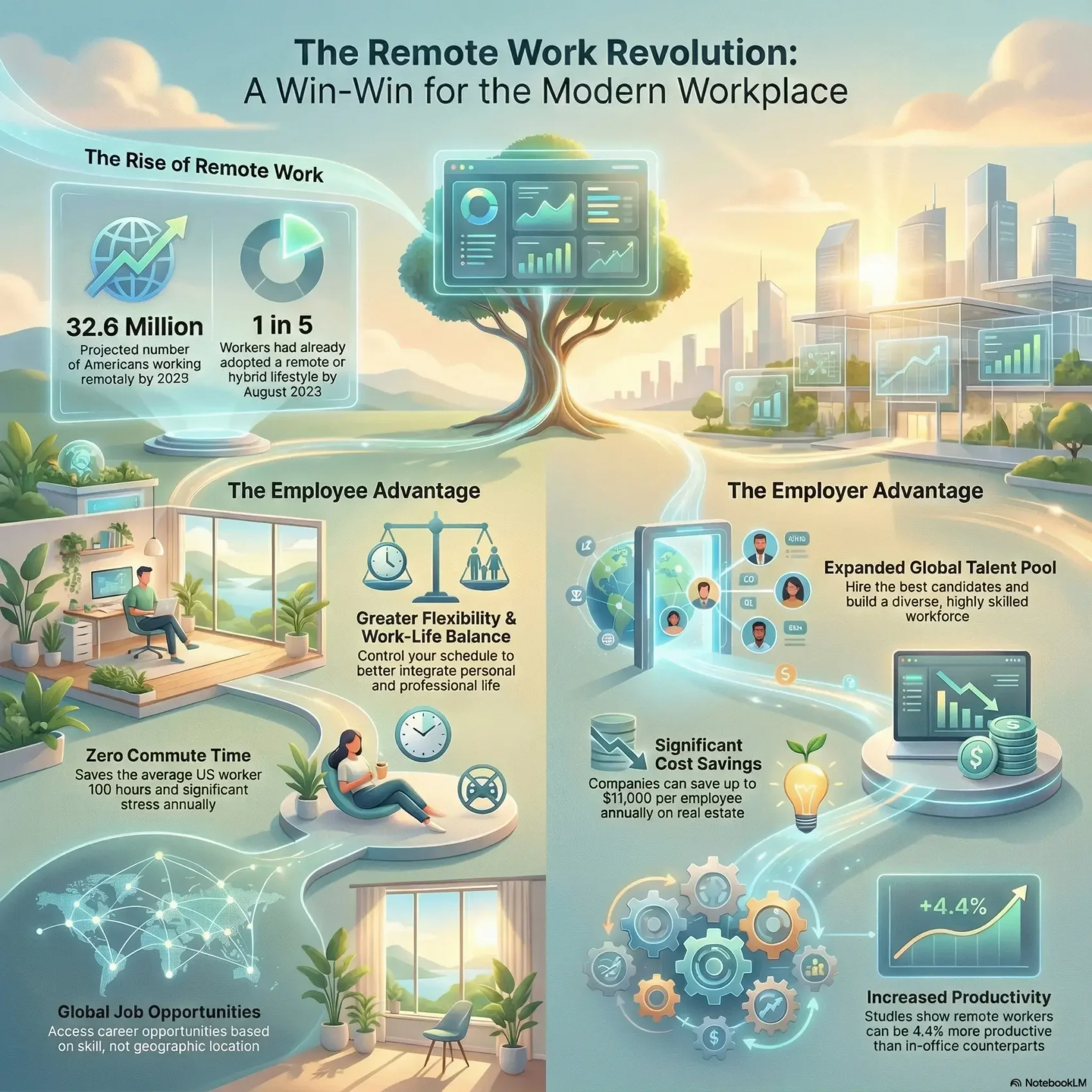Last Updated on December 12, 2025
The rise of remote work has dramatically altered our view of the workplace. This shift, hastened by the COVID-19 pandemic, has pushed millions into working from home. It has uncovered the vast benefits of this new approach. By August 2023, about one in five workers had adopted this lifestyle, marking a notable shift away from traditional workplaces.
Exploring the remote work future reveals it’s not just a temporary trend. It signifies a deep change in how we approach work. You now control your workday, blending it with personal life for a better balance. This shift has reduced commuting stress and time. With forecasts suggesting 22% of the workforce will be remote by 2025, understanding this trend’s future impact is crucial.
Key Insights
- The COVID-19 pandemic has accelerated the adoption of remote work.
- Approximately 1 in 5 workers now telework, reflecting a significant change in corporate operations.
- By 2025, an estimated 32.6 million Americans will be working remotely.
- Flexibility allows you to balance work and personal life effectively.
- Remote work enhances productivity and job satisfaction for many employees.
- Companies gain access to a diverse talent pool through remote work arrangements.
The Remote Work Revolution
The shift toward remote work has transformed workplace dynamics, redefining how you and others engage in your daily tasks. This movement gained significant momentum during the recent global crisis, highlighting the resilience of organizations as they adapted quickly to new circumstances.
The Catalyst of Change
The COVID-19 pandemic served as a major catalyst for this remote work revolution. By May 2020, more than 61.5% of the global workforce transitioned to remote environments, proving that many roles could be fulfilled just as effectively from home. As organizations assessed telecommuting benefits, they recognized an overall increase in productivity reported by 63% of companies. Not only did workers appreciate this shift, but a substantial 73% expressed a desire to continue remote work in the future.
Impact of the COVID-19 Pandemic
The pandemic’s impact on the future of remote work is undeniable. CEOs anticipate full-time office returns within three years, demonstrating a blend of anticipation and caution regarding work models. Despite challenges like higher likelihoods of layoffs and lower promotion rates for remote employees, the positive aspects—such as a better work-life balance and increased flexibility—cannot be overlooked. By 2025, 31% of all workers are projected to engage in remote work full-time, up from just 16% in 2020, illustrating a clear trend toward a more adaptable workforce.
In this evolving landscape, your choice to embrace remote work can enhance your career and personal life significantly. Explore strategies and tools that can help make remote settings effective while fostering a sense of community. For more guidance on navigating remote work dynamics, check out this resource for valuable insights.
Remote Work Future
The work landscape is undergoing significant changes, driven by trends that signal a lasting shift in the workforce. This Remote Work Future marks a move towards a more adaptable and global workplace. It enables individuals to adopt the digital nomad lifestyle, while companies adjust to the evolving remote job market.
Trends Shaping the New Workforce
Several key trends are influencing the future of remote work:
- Hybrid Work Models: Most organizations are choosing hybrid models, where employees divide their time between remote and in-office tasks. This method improves work-life balance and caters to diverse work styles.
- Technological Advancements: Companies are investing in digital tools to enhance connectivity and collaboration. Technologies like AI and VR are crucial in creating virtual office environments and facilitating virtual meetings.
- Asynchronous Work: Organizations are adopting asynchronous work practices, focusing on results rather than time. This flexibility allows teams in different time zones to work together effectively without the need for real-time meetings.
- Focus on Employee Wellbeing: Companies are introducing wellness programs, mental health days, and flexible schedules to support the mental health of remote workers.
- Sustainable Practices: Reduced commuting can significantly lower carbon emissions, contributing positively to environmental sustainability.
The remote job market now offers unprecedented opportunities for higher-paid and educated workers, allowing them to enjoy significant productivity gains. Flexibility in the workplace is highly valued, with many individuals willing to accept lower salaries for the chance to work remotely.
The Benefits for Employees
The shift towards remote work changes not just how businesses operate but also boosts employee well-being in many ways. Key benefits emerge, showcasing the advantages of remote work and the growing trend of working from home. These changes are more crucial than ever.
Increased Flexibility and Work-Life Balance
Remote work’s primary advantage is its flexibility. It lets you manage your schedule better, improving work-life balance. LinkedIn’s study shows 82% of job seekers value remote work highly, and this trend is growing. You can set your work hours, balancing personal and professional life effectively.
Elimination of Commute-Related Stress
Eliminating daily commutes boosts overall well-being. The average U.S. commute is about 27.1 minutes each way, totaling 100 hours annually in traffic. Long commutes increase stress levels. Working from home removes this stress, making work more enjoyable and improving focus.
Access to Job Opportunities without Geographic Constraints
Remote work also means accessing jobs beyond your local area. It connects you to a global talent pool, aiding career growth without geographical limits. With remote work becoming common, you can find roles that match your skills and goals, regardless of location. Studies show this flexibility boosts job satisfaction and helps in retaining employees.
Telecommuting offers more than just convenience; it significantly improves mental health, productivity, and job satisfaction. Exploring these benefits shows how remote work transforms your career.
The Benefits for Employers
The shift to remote work has significantly altered the work landscape for both employees and employers. It has opened up a world of remote work advantages for employers. By embracing remote work policies, companies can access a global talent pool, giving them a competitive edge in the evolving remote job market. This shift also leads to substantial cost savings and opportunities for increased productivity, setting the stage for a promising future of remote work.
Expanding the Talent Pool
Remote work allows employers to tap into a wider range of skills and perspectives. By hiring talent from various locations, companies can select the best candidates, resulting in a diverse and highly skilled workforce. This approach is crucial in today’s competitive labor market, enabling companies to access specialized skills that may not be available locally.
Cost Savings from Reduced Office Space
One of the key benefits is the reduction in real estate costs. With less need for physical office spaces, companies can save on rent and utilities. Many organizations that adopted “work from anywhere” policies reported improved financial health and the ability to invest more in innovation and employee development. These savings enhance overall profitability and sustainability in a competitive economy.
Enhanced Productivity and Job Satisfaction
Studies show that remote employees often experience higher productivity and job satisfaction. The flexibility to work in a preferred environment increases engagement and motivation. Research indicates that remote workers were 4.4% more productive than those in traditional work-from-home setups. This increase in productivity benefits individual organizations and can potentially add significant value to the economy. As more companies embrace remote work, the potential for improved outcomes becomes increasingly evident.
The Changing Nature of Work
The evolution of work dynamics has ushered in significant changes, especially in how we collaborate. Navigating the digital landscape requires understanding the tools for efficient teamwork. The rise of remote work highlights the need for digital literacy, ensuring everyone can engage and collaborate smoothly, no matter their location.
Collaboration in a Digital Landscape
Effective collaboration today relies heavily on digital platforms. The shift to remote work has increased our dependence on tools like project management software and video conferencing apps. These technologies connect team members across different locations. They enable individuals to work flexibly, fitting their needs while achieving shared goals.
Importance of Digital Literacy
Being proficient in digital tools is not just advantageous; it’s essential for success in remote work. It covers everything from using collaborative software to participating in virtual meetings. Digital literacy boosts productivity and communication. As companies adopt telecommuting, staff must enhance their skills to fully utilize these platforms. Investing in training that improves digital competence prepares you for a more remote future.
The Rise of Freelancing and the Gig Economy
The remote job market’s evolution has led to a surge in freelancing and the gig economy. Currently, 36% of the US workforce engages in freelancing, a figure that’s grown by 15% annually. This shift supports the digital nomad lifestyle, offering individuals more control over their careers and multiple income streams.
Opportunity for Independent Contractors
Freelancers relish the ability to select their work hours and locations. This autonomy not only boosts job fulfillment but also draws many to venture beyond conventional employment. Freelancers can delve into a variety of projects or on-demand roles, unlocking a broad spectrum of career opportunities within the evolving work-from-home landscape.
Access to On-Demand Talent
Companies turn to the gig economy to find specialized skills for particular projects. The rise of digital platforms simplifies the connection between employers and freelancers, enabling the seamless access to global talent on demand. This partnership fosters a workforce marked by its flexibility and adaptability.
Challenges and Considerations
Embracing remote work offers many remote work advantages, yet it also presents challenges for both employees and employers. It’s vital to understand these obstacles to create a productive and healthy work environment.
Maintaining Work-Life Boundaries
In a remote setup, it’s challenging to keep work and personal life separate. Work hours often stretch beyond the usual, as the distinction between home and office fades. It’s crucial to manage this balance well to avoid burnout and fully benefit from telecommuting benefits.
Isolation and Self-Discipline Issues for Employees
Remote work can lead to feelings of isolation, reducing face-to-face interactions. Without the structured office environment, self-discipline may falter. Establishing a routine and using various tools can help maintain productivity and combat loneliness.
Legal and Regulatory Considerations
Employers face legal hurdles with remote work. Adhering to tax laws, labor regulations, and compliance is essential to ensure fair working conditions. Creating a framework that meets both organizational and employee needs is critical.
Telecommuting Benefits for Company Culture
In today’s evolving workspace, remote work offers more than just flexibility. It plays a crucial role in building strong relationships across teams spread out over vast distances. By embracing a digital nomad lifestyle, companies can create a unified culture that flourishes even when teams are apart. This is achieved through team-building activities and regular communication channels, which are vital for a sense of belonging and inclusivity in the workplace.
Building Relationships in Remote Settings
Technology helps bridge the gap between employees, ensuring they stay connected despite their distance. For instance, companies offering financial incentives to work from desirable locations can attract top talent. Zapier’s decision to give $10,000 to new hires to relocate from high-cost areas like San Francisco shows how remote work can improve company culture and increase employee happiness.
Remote work leads to a more engaged workforce, resulting in significant cost savings for employers—up to $11,000 per employee annually. With over 98% of employees wanting remote work options, a strong commitment to flexibility not only helps in retaining staff but also strengthens the company’s culture. This leads to better productivity and morale. By understanding and addressing these dynamics, companies can foster a dynamic and successful remote work culture.








